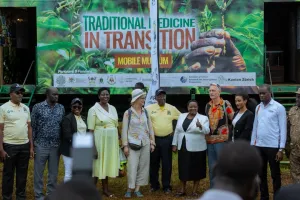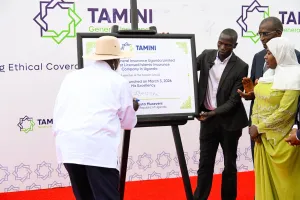
Uganda has set its sights on increasing annual agricultural export earnings to $20 billion by 2040, with the United Kingdom expected to play a central role in driving this transformation.
Speaking at the inaugural UK-Uganda Agro-Industrialisation Forum at Serena Hotel in Kampala on Wednesday, the Minister of State for Trade, Gen. Wilson Mbasu Mbadi, outlined the government’s strategy to unlock the full potential of agriculture, a sector that currently employs more than 70 per cent of Uganda’s workforce but remains under-commercialised.
“If we add value to our products and double their worth, we can increase our export earnings to USD 20 billion by 2040,” Mbadi said. He stressed that the goal will be achieved through enhanced access to credit for smallholder farmers, provision of long-term financing for SMEs, and investments in improved inputs such as quality seeds, fertilisers, and irrigation systems.
Mbadi highlighted the trade imbalance between Uganda and the UK, pointing out that Uganda exported goods worth $28 million to the UK in 2024, compared to $71 million in imports. To narrow this gap, he encouraged UK investors to explore opportunities in Uganda’s agricultural value chains, including coffee, maize, beef, and dairy, as well as agro-industrial parks and facilities for processing, packaging, and regulatory compliance.
“Uganda Airlines’ direct flights to the UK have already removed logistical barriers. They open an avenue for fast, high-quality exports of fish, coffee, fruits, and vegetables to London and beyond,” Mbadi added.
British High Commissioner to Uganda, Lisa Chesney, reaffirmed the UK’s commitment to strengthening agricultural trade ties with Uganda. She underscored that the UK will maintain zero tariffs on 95% of Ugandan goods under its Developing Countries Trading Scheme, covering key exports such as coffee, fruits, and vegetables.
“Whilst other countries are raising tariffs, you can rely on the UK to keep tariffs with Uganda down to nothing,” Chesney noted.
She pointed to ongoing joint initiatives as examples of fruitful collaboration. These include:
- Nexus Green’s solar-powered irrigation projects, backed by more than $100 million in investment from the Government of Uganda and UK Export Finance.
- The £39 million Climate Smart Jobs programme which is helping farmers in Northern Uganda adopt sustainable methods and improve resilience to climate change.
- Efforts to boost Uganda’s presence in global markets, such as showcasing Ugandan coffee brands at the London Coffee Festival, where entrepreneurs tapped into the UK’s £1 billion coffee market.
The government’s Agro-Industrialisation Programme was presented as a pillar of the country’s long-term development agenda. According to Mbadi, investments in processing and value addition are crucial if Uganda is to transition from an exporter of raw commodities to a competitive supplier of premium, processed goods in international markets.
“The support from the UK in technology, investment, and market access will not only help Uganda grow its exports but also uplift millions of farmers and SMEs across the country,” Mbadi said.
The forum, which brought together policymakers, investors, and private sector leaders from both countries, is expected to serve as a launchpad for deeper trade and investment partnerships aimed at modernising Uganda’s agriculture.
If successful, Uganda’s ambitious export target could make the country one of Africa’s leading agro-industrial powerhouses by 2040, with the UK standing out as a vital ally in the journey.













Roswell Mbabazi
Leave a Comment
Your email address will not be published.